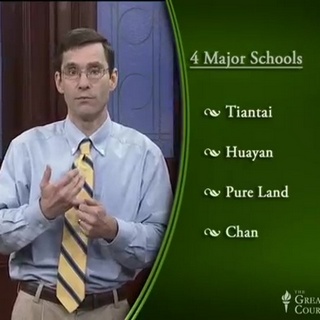
This is the 17th lecture on the Great Minds in the Eastern Intellectual Tradition by Dr. Grant Hardy, in which he looks at the great Chinese traveller and translator Xuanzang, and the various Chinese Buddhist schools that arose.
The first part is concerned with establishing the political history of China, and how that contributed to the acceptance of Buddhism in the country. Around the 6th century CE China was in great turmoil following the dissolution of the Sui Dynasty, and the rise of the Tang.
Xuanzang was also caught up in this, as when he wanted to leave for India to find the missing texts of Buddhism he could not get official permission to leave the country and had to do so illegally.
When 16 years later he returned to China he brought an enormous treasure house of scriptures with him consisting of over 600 texts from the Mahayana and Hinayana traditions, and spent the rest of his life translating many of them.
The next part in Dr Hardy’s presentation concerns the schools that developed in China and became popular in later times, these include Tiantai (focused on the Lotus Sutra), Hauyan (Flower Ornament Sutra), Pure Land and Chan. None of these schools really arose out of Xuanzang’s work, but were the major schools in the country, and still are.
if the video does not appear on the page, try reloading the page; and if that doesn’t work, leave a comment so I can update the page (the comment is not published)
to see an album of screenshots click here
Too good. I am impressed with the scholarship of Sri Grant Hardy, PhD and his well researched, anecdotally rich and very fluent delivery.
A pleasant learning experience. Hope to see all his videos here. Great work. Pl keep it up.